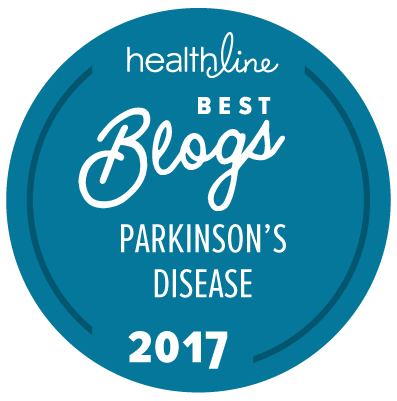Kate
Terri Reinhart
Two pieces of news came to me the other day, almost at the same time. The first was news we all heard: Alan Alda came out publicly to say he had been diagnosed with Parkinson's disease 3 years ago. As he was diagnosed quite early, before the classic symptoms of PD had begun, he is still just beginning this journey. Not long after reading this, I received a message to say Kate Kelsall had passed away on Sunday, July 29, ending her journey with Parkinson's disease.
Ask anyone who knew Kate and the first thing you'll probably hear is "She was a force to be reckoned with". Kate took the Parkinson's community by storm. She had DBS surgery and, with Valerie Graham, was a patient liaison for patients having DBS and they started the Bionic Brigade support group. She talked Paul and Carolyn Zeiger into starting a support group for caregivers. She danced, played accordion, went to the World Parkinson Congress in Montreal, won a channel 7 Everyday Hero Award with Valerie, among many, many other things, and... she wrote a blog.
In her very first entry, dated September 27, 2006, Kate talked about being approved for long term disability benefits, thus confirming what she knew already: Parkinson's disease is "chronic, permanent, progressive, and incurable". She had hoped she would be the 2nd miracle which Pope John Paul II needed for his sainthood application or at least the "DBS or PD poster child". In the last paragraph, she makes a sobering observation: The letter further stated: “In no event, will benefits be payable beyond October 1, 2015.” Oh well, perhaps I won’t have to worry about it. I doubted if I’d even be around with advanced PD in 2015 or as Nora Ephron described it her latest book, "I Feel Bad about My Neck" as “dancing around the D word.”
Kate talked about her DBS surgery, dancing, her challenges with speech, her frustrations and her victories. She listed resources, talked about various forms of exercise, and discussed ways to make our lives better. She interviewed others and encouraged guest bloggers to allow her to publish their writing. She was the first person to publish my articles. I'm not even sure how she found out about my writing.
She also wrote about death. She didn't even "dance around the D word". Kate talked about the death of her mother: "We fear that our Mom who suffers from Lewy Body Dementia (LBD) will either choke to death or starve to death." and "Aspiration pneumonia, a leading cause of death with Parkinson’s patients, often develops as a complication of mealtime swallowing problems, leading to the inhalation of food and drink." She answered one reader's question on October 16, 2007 with: "Frankly, my greatest worry is when and how I am going to die. The only blog posting that I started but didn’t finish was about dying with or from PD."
I argued with Kate about this. We got together a few times and we corresponded a lot through email. She told me she certainly wasn't going to live to be 80 years old and that she'd probably die of aspiration pneumonia. I insisted that we don't die from PD, but with PD. She smiled. She was sure she was right. We argued amiably about a few other things, too, like whether one could drive with dystonia and the proper length for blog posts. This one would already be too long in her opinion.
It's humbling to realize now, but Kate was right. When she died of aspiration pneumonia, 21 years after she was diagnosed, she was 67 years old. Parkinson's disease not withstanding, she barreled her way through life, always working to provide support and resources for people to make their lives better. It's really hard to imagine any Parkinson's function without her.
Well, Kate, take a little breather then, wherever you are, keep on being the force you were here on earth. Sing! Talk and yell and shout and dance! You've finally left your PD behind for good.







